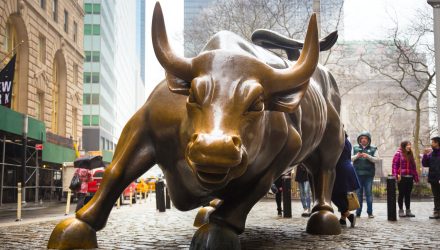After selling off during the overnight futures session, following a contentious presidential debate, stocks and index ETFs are rallying on the last day of the month, fueled by optimism over further fiscal stimulus. Despite the gains however, the market is headed for its first losing month since March.
The Dow Jones Industrial Average gained traction on Monday, adding 450 points, or 1.6%, while the S&P 500 advanced 1.3%, and the Nasdaq Composite rallied 1.4%.
The major stock index ETFs are also attempting a run higher Wednesday along with their underlying benchmarks, as the SPDR Dow Jones Industrial Average ETF (DIA), SPDR S&P 500 ETF Trust (SPY), and Invesco QQQ Trust (QQQ) are all climbing as of 1145AM EST. The iShares Core S&P 500 ETF (IVV) gained over 1.26% Wednesday as well.
“I say we’re going to give it one more serious try to get this done and I think we’re hopeful that we can get something done,” Mnuchin said at the Delivering Alpha conference presented by CNBC and Institutional Investor. “I think there is a reasonable compromise here.”
ADP’s monthly private-sector jobs count revealed growth of 749,000 in September, prior to the 600,000 projected by a Dow Jones economist survey. In addition, pending home sales continued to excel last month, gaining 8.8% to notch its fastest increase on record, according to the National Association of Realtors survey.
But, after a scathing presidential debate, which portends a more difficult period following the election, and a month of declines, benchmark stock indexes are still mired in losses in September and headed for their first monthly losses since March. The S&P 500 has given up 4.7% this month through Tuesday’s close, and is targeting its first monthly loss in the last half a year, while the Dow Jones and the Nasdaq Composite have dropped 3.4% and 5.9%, respectively, in September.
“It was a long night and there’s a lot that needs to be sorted out,” said Daniel Deming, managing director at KKM Financial, about the presidential debate. “It became pretty apparent that this thing is not going to be over on Nov. 3 and I think the market is probably not too crazy about that.”
“The short-term volatility pressures probably won’t abate anytime soon after this debate. In a sense, it’s creating even more uncertainty,” Deming said.
Most analysts believe that the debate did little to quell voter and investor concerns about the economy, the coronavirus, and a peaceful transition to the next U.S. leader.
“Most people come away from it thinking it was an ugly experience,” said Marc Chandler, chief market strategist at Bannockburn Global Forex. “I don’t think it changed peoples’ minds really.”
“Questions on election fraud were raised, which will add to concerns about a volatile post-election period if there is a close or uncertain electoral outcome,” wrote Ed Mills of Raymond James in a note entitled “Dumpster Fire Debate.”
Despite debate drama, there was some sanguine coronavirus data, which could be helping to boost markets Wednesday as well.
Regeneron said yesterday that its REGN-COV2 drug lowered viral levels and ameliorated symptoms in non-hospitalized coronavirus patients, while Moderna’s potential coronavirus vaccine appears safe and efficacious in older adults, according to study results published in the New England Journal of Medicine.
For more market trends, visit ETF Trends.
